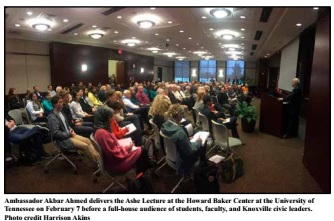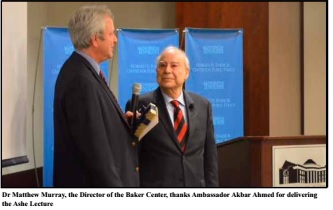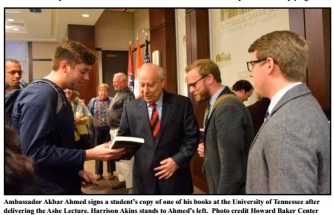Showdown in Tennessee
By Dr Akbar Ahmed
American University
Washington

Every journey carries in it the seeds of drama. My trip to the small city of Knoxville in Tennessee in February 2018 provided a glimpse into the controversy and heat around Islam in the US through a public showdown. The showdown was not with pistols in a dusty shanty town in the Old West but on the campus of a leading American university in the halls of a renowned academic center.
On one level, the trip could be read as ideally organized and implemented; the visiting speaker’s dream. I had been invited to deliver the prestigious Ashe Lecture at the University of Tennessee and would become the first Muslim to do so. Every event of the several leading up to the climax at the main public lecture was colored with the famous Southern hospitality and charm. Harrison Akins, my former assistant at American University, who had initiated and organized the invitation, picked and dropped me at the airport. Harrison, who was completing his PhD degree, had developed into a passionate and articulate champion of building bridges between Muslims and the West. His parents were on hand to show support.
The Ashe Lecture series, held by the Howard H. Baker Jr. Center for Public Policy at the University of Tennessee, was endowed by the distinguished Ambassador Victor Ashe, a popular local figure who served as the former US Ambassador to Poland and as Mayor of Knoxville for sixteen years. He graciously presided over lunch, introduced my talk, and concluded the day by hosting dinner at one of the top restaurants in the city.
The title of my Ashe Lecture was, “Being Muslim today: Building bridges in an age of uncertainty.” The audience in the Baker Center overflowed the auditorium and there was excitement in the air as the elite of the city took their seats—ambassadors, mayors, commissioners, scholars, students, and members of the Muslim community. At the end, the audience rose to give me a standing ovation. Dr Matthew Murray, the Director of the Baker Center, said no speaker in the Ashe series had ever received a standing ovation.
As I awaited my return flight to DC, I received the following message from Murray: “We had a wonderful turnout and one of the largest ever for this lecture series. The standing ovation you received from the crowd signifies the support you received from the university and broader community. Your remarks touched the hearts of many in the room and created lasting memories.... best of luck to you as you continue to carry this important message forward.”
So by all metrics the occasion was a success.
But the event could also be read through a different lens and provides us a case-study of America’s relationship with Islam today.
This part of Tennessee is overwhelmingly white, Christian, and of Scots-Irish background. The region’s struggling economy, best symbolized by the much-cited laying off of coal miners, has created a sense of anger and resentment among people here. They are seen as the Americans who propelled President Donald Trump to the White House.
There was violence in the air. Only that morning, a news item described a local sheriff who had ordered the shooting of a man he was pursuing in a car chase when the victim had driven away from a traffic stop. He was recorded on a deputy’s body camera saying, “I love this shit.”
The sheriff reflects the larger gun culture in America: over 100,000 Americans are shot annually by fellow Americans, killing some 40,000. Even school children are not immune. This year alone, there has been an average of three shootings per week on school grounds. Just a few days after my talk, a young sympathizer of white supremacists killed 17 people at a school in Florida.

Muslims have become a favorite target in the last few years. Attacks on mosques and women have reached an all-time high and Islamophobia is rampant. President Trump came into office determined to impose a Muslim travel ban and recently boasted of extending the life of Guantanamo Bay prison. There was even talk of deportation and the erection of prison camps such as those built to intern Japanese-Americans during the Second World War.
It was not surprising therefore that a small group in Knoxville, associated with prominent local figures, had been lobbying against the idea of inviting a Muslim speaker. It had sent out emails explaining why I should not be invited. Though the university had decided to go ahead with the lecture, it had taken the precaution of ensuring there were several large policemen on duty at the event.
The showdown came after my talk and at the start of the question and answer session. A questioner, who had led the campaign against Muslims, stood up and aggressively went through a list of what the Guardian called the “The new playbook of the right” in “How to stop a mosque,” coincidentally published the following day.
He left out the accusation that President Obama was a secret Muslim who had inserted himself into the political system to destroy America from inside (some forty percent of Republicans still believe that Obama is Muslim), otherwise the familiar accusations Islamophobes use across America were all there.
Calculating that he had the backing of the local audience, he aimed to derail my talk and put paid to the idea of ever inviting Muslims again.
The questioner claimed I had co-authored an article with Tariq Ramadan, implying that I was associated with him and his way of thinking which he said was unfairly critical of the US. He also accused me and other Muslim scholars of ignoring female genital mutilation and stoning, implicitly endorsing the campaign to introduce Sharia into America, and supporting the cruel and brutal treatment of women in Islam. Underlying this tirade was the sub-text that Muslims hate Christians and have launched a jihad against them.
I was not expecting the aggressive onslaught, but I stood my ground and rebutted each point systematically. I said: he was incorrect in stating that I had written and collaborated with Tariq Ramadan in an article or any other project. I had no contact with him nor had met him. And about my not condemning the terrible practices against women, I have condemned them as un-Islamic. I also explained to the audience that the talk of Sharia being imposed in America, to me, was absurd because a population of less than two percent could not impose its will, even if the majority wished, which they did not, through democratic and constitutional means on the non-Muslim 98 percent of the population. Besides, I pointed out, even in Muslim countries like Pakistan, where the population is 98 percent Muslim, Sharia has not been imposed as the law of the land.
I pointed out that countless heroic Muslim women in the Muslim world, including my own daughter, are promoting understanding and building bridges in a very difficult environment. Furthermore, at least four or five members of my wife’s family had been shot by militants for supporting a modernist Islam in the turmoil in that part of north Pakistan where many men insist that women should not be educated and locked up in their homes. So for ill-informed men in America to condemn the entire body of Muslim society while unaware of the challenges and sacrifices of Muslim men and women in the field reflects on their ignorance and lack of information.
Demonstrating the many similarities and connections between Christianity and Islam, I also pointed out that not only is Jesus one of the most revered figures in the Qur’an for every Muslim, but Mary, the mother of Jesus, is especially revered and has an entire chapter in the Qur’an named after her and devoted to her. A Muslim cannot, by definition, be disrespectful of either Jesus or Mary.
I asked the questioner if he had actually read anything I had written or was he just making things up. I urged him to get his facts right and obtain more information. I again emphasized the use of the Socratic method, which emphasized facts, research and logic.
I had barely finished my detailed answer when the audience burst into a prolonged applause. If the audience had been wavering between its preconceived ideas of Islam and my explanations, it wavered no more.
Being Muslim with a Pakistani background meant I was asked tough questions in every forum about US-Pakistan relations. President Trump’s first tweet in the New Year had accused Pakistan of extracting billions from the US and giving “nothing but lies and deceit” in return, bringing the issue to the fore across America. Some accused Pakistan of hiding Osama Bin Laden in Abbottabad. I explained why Pakistanis are so upset. Pakistan had lost some 60,000 lives and billions of dollars in property damage by being thrown against its will into America’s War on Terror, yet the world had come to know Pakistanis not as victims but promoters of terrorism. Nonetheless, the US and Pakistan needed to restore normalcy in their relations. Without working with Pakistan it will be impossible for the US to settle the war in Afghanistan and it may end up losing both nations as geopolitical allies in that critically important part of the world.
In light of this challenging time for America and the growing gap between the West and the Muslim world, I emphasized the ideal of a pluralist, religiously inclusive America as reflected in the vision of the Founding Fathers and gave the example of the statue of the angel alongside that of Thomas Jefferson at his University of Virginia, which holds a tablet saying “Religious Freedom, 1786” and has the various names of God including Allah.

I also pointed out that Islamophobia is a slippery slope. Muslims may be the target today, but tomorrow other minorities will be in the line of fire.
It does not take long for an audience, however distinguished, from turning into a mob and uniting against what it perceives as a common foe. If the questioner had succeeded in whipping up anti-Islamic sentiments, which are more widely accepted in society than we imagine, things could have turned ugly. Instead, the audience rose to give me a prolonged standing ovation.
After it was over, many individuals came up to me beaming from ear to ear, some of them clearly Muslim, and said they were thrilled to be present at the event. I met Uzbeks, Arabs, Kurds, African American converts and a Pakistani doctor with his wife. They said they had to endure these hostile questions almost daily and this was the best way to convincingly and strongly refute them. Many non-Muslims had brought various copies of my books for signature.
Just days later, Georgiana Vines, a prominent local journalist, wrote about the event for the Knoxville News Sentinel under the headline, “Leading authority on Islam talks religion bridge-building at UT.” Frankie Martin, who had accompanied me from DC, also wrote an excellent account, “Discussing Islam in East Tennessee,” in the Pakistan Link. Martin’s conclusion is noteworthy:
“Thinking about the event afterward, I believed that I understood why the Knoxville audience had responded so positively to the talk, and it partly had to do with the hostile question and Ahmed’s response. Many people may feel uneasy about stereotyping and responding with hatred towards a large group of people but lack the understanding and arguments to effectively push back against such voices. In Ahmed’s response, I believe they encountered a fact-based argument that made sense and appealed at the same time to the cherished American ideal of religious freedom and liberty. The challenge is to have more of these events and for the increasing hatred of Islam and Muslims to be refuted in this manner in public events and in the media.”
The showdown in Tennessee gave me not only insights into American society today, but real hope and confidence that given the facts Americans, in the end, to quote a statement attributed to Winston Churchill, “will always do the right thing.”
-----------------------------------------------------------------------------

